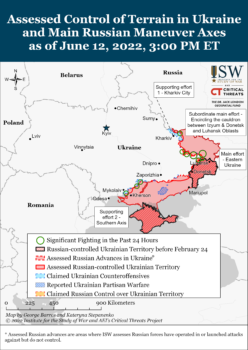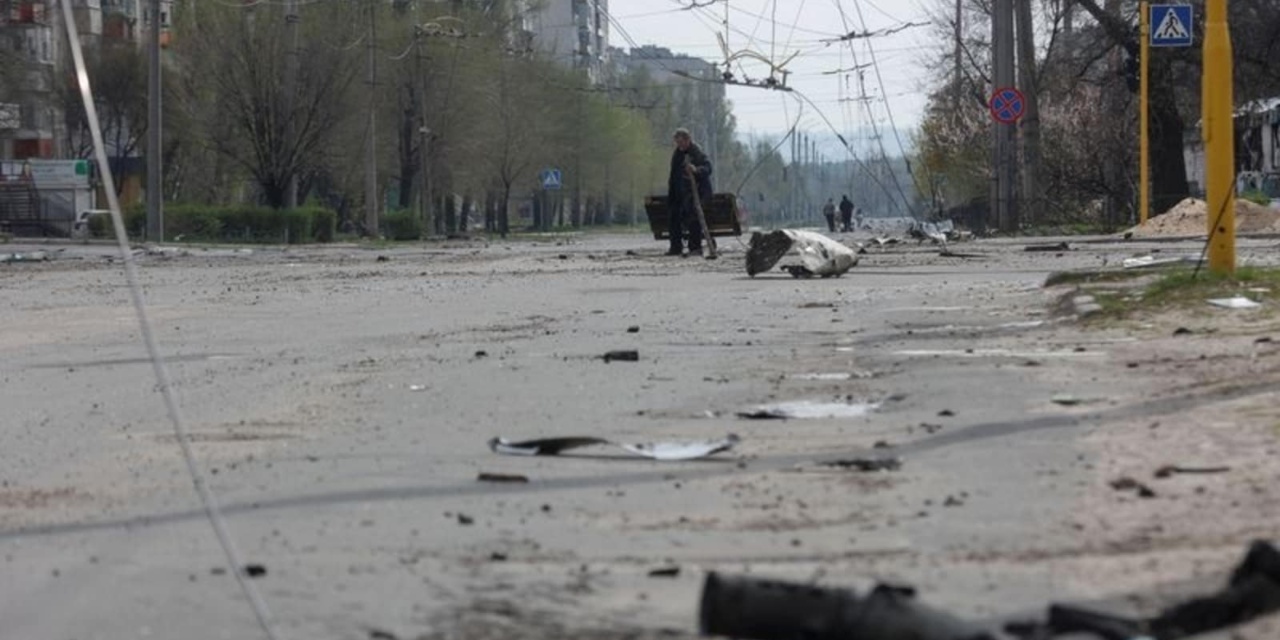A resident walks past buildings damaged by a Russian strike on Sievierodonetsk in the eastern Luhansk region of eastern Ukraine (Reuters)
Russia’s Forcible Deportation of Ukrainian Teacher Viktoria Andrusha
Wednesday’s Coverage: Zelenskiy Appeals for Anti-Missile Systems

Source: Institute for the Study of War
UPDATE 1640 GMT:
UN human rights head Michelle Bachelet says that “the intensity and extent of hostilities, destruction and death and injury” in devastated and Russian-occupied Mariupol “strongly suggest that serious violations of international…law have occurred”.
She said that amid Russian bombardment and siege, Mariupol was “likely the deadliest place in Ukraine”, leaving an “indelible mark” on generations to come.
Noted that the Russians blocked access by her staff to Mariupol, Bachelet said her office had nonetheless verified 1,348 civilian deaths, including 70 children. She emphasized that the actual death toll is “likely thousands higher”.
Ukraine Government representative Tetiana Lomakina, echoing the statements of Mariupol Mayor Vadym Boychenko, said at least 22,000 people were killed. Another 47,000 have been “forcefully transferred” to Russia or RUssian-occupied areas.
Bachelet, in line with the exiled Mariupol officials (see 0718 GMT), said the situation in the port city is “dire”, with residents “struggling daily with limited access to basic utilities and social services, such as medical care”.
UPDATE 1619 GMT:
Meeting Ukraine President Volodymyr Zelenskiy in Kyiv, European leaders — France’s Emmanuel Macron, Germany’s Olaf Scholz, Italy’s Mario Draghi, and Romania’s Klaus Iohannis — have supported “immediate” European Union candidate status to Ukraine.
At a joint press statement Macron’s endorsement was amplified bu Draghi’s “main message” that Italy wants to see Ukraine as a part of the EU.
We are at a turning point in our history. The Ukrainian people defend every day the values of democracy and freedom that underpin the European project, our project. We cannot wait. We cannot delay this process.
The French President had previously said that it would take “decades” for Ukraine to be granted EU membership, proposing an alternative form of relationship with Kyiv.
Macron also said France will escalate arms deliveries to Kyiv.
Scholz pledged that Germany will support Ukraine’s “heroic” resistance against Russia’s invasion as long as necessary.
Zelenskiy, saying the Russian invasion was an aggression against all of Europe, emphasized military assistance from the West. He said that greater aid will lead to faster liberation of occupied Ukrainian territory.
He added that the meeting discussed further sanctions against Russia and post-war reconstruction of Ukraine.
Before the meeting, Macron, Draghi, and Scholz visited Irpin, a town near Kyiv where occupying Russian forces carried out mass killings.
Scholz said:
Irpin, like Bucha, has long since become a symbol of the unimaginable cruelty of the Russian war, of senseless violence.
The brutal destruction in this city is a memorial — this war must come to an end.
Macron praised the heroism of Ukraine’s army and people and noted the “traces of barbarism” left by Russian forces.
UPDATE 1610 GMT:
The Netherlands intelligence service AIVO says it foiled Russia’s attempt to infiltrate the International Criminal Court, as the ICC investigates Russian war crimes in Ukraine.
The service’s head Erik Akerboom said an agent of the Russian military intelligence service GRU, Sergey Vladimirovich Cherkasov, used a false identity as a Brazilian national for an internship at the Hague-based ICC in April.
“This was a long-term, multi-year GRU operation that cost a lot of time, energy and money,” Akerboom explained. “It clearly shows us what the Russians are up to — trying to gain illegal access to information within the ICC. We classify this as a high-level threat.”
Cherkasov, under the alias Viktor Muller Ferreira, was picked up at a Dutch airport and put on the next flight back to Brazil, where he faces court proceedings.
UPDATE 1605 GMT:
At least three sheltering civilians have been killed and seven injured by a Russian strike on Lysychansk in eastern Ukraine, says Luhansk Governor Serhiy Haidai.
Rescuers are clearing the rubble of the building.
UPDATE 1100 GMT:
The UK has announced new sanctions on Russia over the “barbaric treatment of children in Ukraine”.
Those sanctioned include The Russian children’s rights commissioner, Maria Lvova-Belova, for the “forced transfer and adoption” of 2,000 Ukrainian children.
Patriarch Kirill, the head of the Russian Orthodox Church, is blacklisted for “his prominent support of Russian military aggression in Ukraine”.
Four senior military officials from a unit “known to have killed, raped, and tortured civilians” in the Ukrainian town of Bucha are also sanctioned.
UPDATE 1049 GMT:
Russia is threatening to cut the Nord Stream 1 gas flow to Germany.
After Gazprom said it is cutting the supply by 40%, on the pretext of “technical issues”, the Russian Ambassador to the European Union, Vladimir Chizhov, warned of a “catastrophe” for Germany with a complete halt.
UPDATE 0733 GMT:
IKEA is selling its four factories in Russia.
The Swedish company announced on Wednesday:
Businesses and supply chains across the world have been heavily impacted, and we do not see that it is possible to resume operations any time soon. As a consequence, Inter IKEA Group and Ingka Group have now each decided to enter a new phase to further scale down the IKEA business in Russia and Belarus.
The IKEA retail business will remain suspended, and the workforce will be reduced, meaning that many co-workers will be affected. In order to support the scaling down process, Ingka Group plans to sell out its home furnishing inventory in Russia.
IKEA announced on March 3 that it was suspending all business in Russia.
UPDATE 0718 GMT:
The exiled deputy mayor of Mariupol says residents of the occupied port city are facing a cholera outbreak amid a lack of safe drinking water, food, and medical assistance.
Sergei Orlov told Ireland’s RTE:
Mariupol is in deep humanitarian crisis because of a lack of food and the spreading of diseases including cholera.
The biggest fear is that people will start to die because of the lack of medical help and the fast development of illnesses.
There is a lot of information that illnesses have started. It is mostly illness from dirty hands.
Orlov echoed the comments of Mariupol Mayor Vadym Boychenko that the spread of disease is exacerbated by the bodies of victims, uncollected in the rubble of houses destroyed by the Russians, which are polluting water supplies.
He also cited the accumulation of thousands of tons of rubbish and waste on Mariupol’s streets.
Russia destroyed all municipal services. The city is living without a centralized electricity supply, water, sewage system or natural gas supply.
People are still preparing food on open fires on streets and washing their clothes on the streets by hand. That is why it’s a real humanitarian crisis.
UPDATE 0712 GMT:
Russian opposition activist Alexei Navalny has confirmed his transfer to a maximum security prison.
Navalny’s aides expressed alarm on Tuesday that he had been moved from a prison colony to an unknown location.
Navalny wrote on Telegram that he is in the IK-6 prison in the village of Melekhovo, about 250 kilometers (155 miles) east of Moscow. He is confined in a “strict regime” and in quarantine,
“My space travel continues,” he said. “I’ve moved from ship to ship.”
The activist survived poisoning with Novichok nerve agent in 2020 but was imprisoned for 2 1/2 years for “parole violations” in February 2021 after he returning from treatment in Germany following the assassination attempt.
On March 24, Navalny was sentenced to a further 9 years in prison for fraud and contempt of court. He said two weeks ago that he has been charged with creating an extremist organisation and inciting hatred towards the authorities, each charge carrying a maximum prison term of 15 more years.
UPDATE 0648 GMT:
Ukrainian officials say Russian forces are struggling to consolidate their control of occupied areas in southern Ukraine.
The officials say Ukrainian partisans targeted employees of the Russian Emergency Ministry in Mariupol on June 9 and 11. In Berdyansk, the Russians have been unable to open schools because of resistance from Ukrainian teachers, who refuse to teach Russian curricula.
UPDATE 0630 GMT:
Despite their pressure on Sievierodonetsk, Russian forces in the Donbas in eastern Ukraine are is highly likely to be operating in ad hoc and severely undermanned groups, according to UK military intelligence.
The analysts say, “Some Russian Battalion Tactical Groups (BTGs) — typically established at around 600 to 800 personnel – have been able to muster as few as 30 soldiers.”
Having destroyed the three bridges to Sievierodonetsk, “Russia will now likely need to either conduct a contested river crossing or advance on its currently stalled flanks to turn tactical gain into operational advantage”, the latest report concludes.
Inside contested cities like Sievierodonetsk, “front line combat is likely increasingly devolving to small groups of troops typically operating on foot”.
UPDATE 0625 GMT:
A Russian air-launched rocket strike has killed four people and wounded six in a suburb of Sumy in northern Ukraine.
Regional governor Dmytro Zhyvytskyi said another rocket strike hit the Dobropillia district, next to Russia, at 5 a.m. Thursday, followed by 26 mortar rounds fired from across the border.
UPDATE 0547 GMT:
French President Emmanuel Macron, German Chancellor Olaf Scholz, and Italian Prime Minister Mario Draghi will meet Ukraine President Volodymyr Zelenskiy in Kyiv on Thursday.
The three leaders are on an overnight train from Poland. It is the first time since the Russian invasion that each has travelled to Ukraine.
It is well after midnight on the train from the Polish border to the Ukrainian capital. pic.twitter.com/Vz1avMCnql
— Patrick Wintour (@patrickwintour) June 16, 2022
ORIGINAL ENTRY: The UN has warned that thousands of civilians, including women, children and the elderly, are trapped in Sievierodonetsk, as Russian forces bombard and try to overrun the city in eastern Ukraine.
A spokesperson for the UN’s humanitarian affairs office, Saviano Abreu, spoke of the diminishing supply of food, clean water, sanitation, and electricity for the estimated 10,000 civilians who remain in Sievierodonetsk, which had a pre-conflict population of 100,000.
Both parties of the conflict have an obligation under international humanitarian law to protect civilians, so it is not an option — they have to assure the people who want to leave the city that they can do it safely.
The head of Sievierodonetsk’s military administration, Roman Vlasenko, said of the civilians in Azot, “There are food stocks, but they have not been resupplied for two weeks. So stocks won’t last long. If there is a humanitarian corridor, I believe people are ready to leave.”
A Russian offensive, hoping to salvage gains from Vladimir Putin’s war, has tried for weeks to seize Sievierodonetsk and its sister city Lysychansk, the last two major Ukrainina-held areas of the Luhansk oblast. Relentless shelling and airstrikes have levelled Sievierodonetsk and destroyed all critical infrastructure.
Earlier this week, the Russians completed the demolition of the three bridges across the Siverskyi Donets River between Sieivierodonetsk and Lysychansk.
Trying to escape any blame for its assault — and using its tactic from the Syrian conflict and from elsewhere in Ukraine — the Russians declared that they were arranging a “humanitarian corridor” on Wednesday for evacuations. When there was no corridor, they claimed that Ukrainian forces are holding civilians hostage.
The Ukrainian defenders ignored the Russian demand to surrender. They continue to hold the industrial area and perimeter of Sievierodonetsk.
They also have prevented the city from being surrounded. The head of the Sievierodonetsk military administration, Oleksandr Struik, said evacuations are being carried out “every minute when it is quiet there, or there is a possibility of transportation”.

